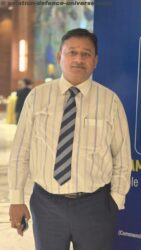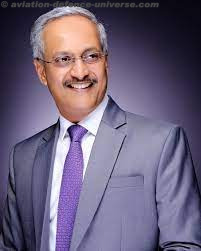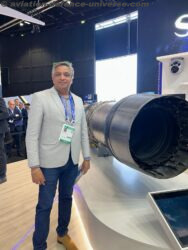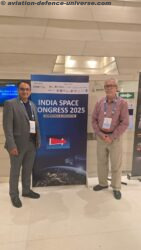- Keeps supply chains moving
- Helps communities globally
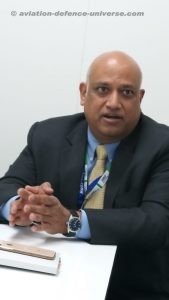
New Delhi. 02 June 2020. “As the world navigates the COVID-19 outbreak, our people are doing incredible things to help our customers, keep our supply chains moving and assist hospitals, armies, governments, and communities around the world,” Kishore Jayaraman, President, Rolls-Royce India and South Asia in an exclusive interview to Aviation & Defence Universe(ADU).
ADU. What measures has Rolls-Royce taken to deal with the COVID 19 crisis?
KJ. As the world navigates the COVID-19 outbreak, our people are doing incredible things to help our customers, keep our supply chains moving and assist hospitals, armies, governments, and communities around the world.
The health and safety of our people is our top priority at this time. We are working with our teams to ensure our people are safe, while facilitating business continuity. We have limited all international and domestic travel to business critical only, and are providing regular guidance and updates to all employees through internal channels. Our employees have been working from home, and using virtual formats like video calls or Skype for essential meetings. At the same time, we have implemented all requisite measures across our facilities to ensure a safe environment for people who are returning to the workplace.
Across Rolls-Royce, we have been inspired by the dedication of our employees who have been volunteering in their local communities to help deal with the impact caused by COVID-19. We’re also part of the Ventilator Challenge UK, a consortium making 20,000 ventilators for UK’s National Health Service (NHS).
Our facilities across the globe are operating with stringent distancing norms, keeping our production lines moving, monitoring the many cargo flights that are delivering aid and essential supplies, and assisting armed forces as they provide vital support to communities. Our Airline Support Teams work at airports around the world to support our customers.
There will be a new normal that emerges from this crisis, and together we have an extraordinary opportunity to make it a better normal.
ADU. Has the global lockdown resulted in job cuts at Rolls Royce? If so, can you give the statistics.
KJ. The impact of the COVID-19 pandemic on the whole aviation industry is unprecedented. We have taken swift action to increase our cash reserves and dramatically reduce our spending in 2020 to strengthen our resilience in these exceptionally challenging times. We now have to take further steps to secure the long-term future of Rolls-Royce and ensure we can continue to innovate for years to come.
Regrettably, this includes reducing the size of our workforce to meet the reduced customer demand, as it is now clear that activity in the commercial aerospace market will take several years to return to previous levels. As we are working through the details of this with our employee and trade union representatives in the UK and RRD, and regional leads in other locations, we are not able to provide further information at this stage.
We have come through troubled times before to achieve incredible things and we will do so again.
ADU. With the general business cycle getting affected, are you utilizing this time for new research & development in technology?
KJ. Rolls-Royce operates in a very technology-intensive industry, which means our products require year-on-year investment in new materials, in understanding of the physics of the products and the digital infrastructure around them, without which our products would start falling behind.
Innovation is at the heart of Rolls-Royce. Throughout its history, Rolls-Royce has pursued ever cleaner, safer and more competitive power – developing ground-breaking technologies and providing the world’s most powerful and efficient aero-engines.
In the future, as we move to a low carbon global economy, our engines will become part of broader, hybrid systems with lower emissions and lower environmental impact. These systems will deliver more power; essentially more electric, more intelligent power.
We also lay special emphasis on improving the productivity, manufacturing practices, plus new ways of designing and servicing products, using sophisticated technology. We will also continue our work towards realising our IntelligentEngine vision for the future of aircraft power, including new integrated engine controls, allowing faster and more effective ground support.
In our marine business we are exploring new methods of ship intelligence and autonomous shipping. The results will help optimise ship and crew performance. Our defence business is utilising digital innovation to ensure it can deploy the right assets to the right places required for military operations.
In India, our Engineering teams continue to work on critical projects in the areas of product design and development, as well as towards improving efficiency and data innovation.
Rolls-Royce is in great shape for future engine development programmes as well as for developing solutions to meet critical power requirements. As a key player in vital power markets across the world, we believe we have a responsibility to continue the work we are doing, as it will only be more relevant in the times ahead.
ADU. Digital is becoming the new normal. How do you see the role of technology going forward?
KJ. COVID-19 has changed the world as we know it. Digital is the future, and we believe that data led insights can play a significant role in leapfrogging economic recovery. With this in view, Rolls-Royce has invited a group of leading companies to collaborate on Emer2gent, a new alliance of data analytics experts challenged with finding new, faster ways of supporting businesses and governments globally as they recover from the economic impacts of COVID-19. Emer2gent will combine traditional economic, business, travel and retail data sets with behaviour and sentiment data, to provide new insights into – and practical applications to support – the global recovery from COVID-19. This work will be done with a sharp focus on privacy and security, using industry best practices for data sharing and robust governance.
We also recognise that digital skills will be very important in the coming years. We have opened up the Rolls-Royce Digital Academy for public to benefit from a range of online training programs to improve their digital skills. The Rolls-Royce Digital Academy has trained 20,000 of our employees in the last two years. Through this platform, we are offering several programs in collaboration with our partners:
· DataCamp – to experience the top data science, artificial intelligence and machine learning courses used by Rolls-Royce employees
· edX – Rolls-Royce’s own CPD-accredited digital skills fundamentals programme containing six key courses including data awareness, the power of data and agile mindset
· Google for Education –The ready-to-use video lessons teach digital skills that have immediate, real-life applications that provide students with the skills needed to succeed in the classroom and on the job, from researching to analysing data
· IBM – Machine Learning for Kids: This course provides hands-on experience in an easy-to-use guided learning environment to the people who will be programming the machines of the future
· Learning Tree – Delivered by an award-winning industry leader, immerse in a suite of e-learning modules, white papers, skills assessments, live and recorded webinars on topics from agile to data analytics
· TeenTech – For students 11-19 years, there are weekly insights into world-class organisations and the opportunities that lie within them. Each session will be themed and hosted by sponsors and industry experts with Rolls-Royce leading an Innovation at Home day on 18th May
· TechWeCan –free, easy to use and fun lesson plans for home schooling children (aged 10-13); children can learn about the opportunities a career in technology can offer
ADU. Are you planning to tie-up with any Indian universities?
KJ. As India aims to capture the opportunity of becoming a global manufacturing hub, it will need to build an ecosystem. We will need connected and efficient value chains, technology and service providers, infrastructure, R&D and trained workforce at all levels. To handle high-end and high-value work, there is a growing need to develop highly skilled talent. Technology-driven education and training play an important role to build a workforce for the future.
In March this year, we inked an MoU with the Indian Institute of Technology, Madras (IIT Madras) to promote and explore opportunities for joint research programmes. Rolls-Royce will also roll out a ‘Technical Higher Study Framework’ to facilitate higher education for its engineers keen to pursue Masters and PhD level studies, in partnership with IIT Madras.
ADU. Tell us the update on other initiatives like the Unnati scholarships for women engineers
KJ. Through various community outreach programmes, Rolls-Royce has touched the lives of nearly 100,000 students in India, from diverse backgrounds, inspiring and teaching them about STEM education and careers, as well as providing skill development.
At Defexpo in February 2020, we announced our ‘Unnati’ skill development program with CEMS and ‘Unnati’ Scholarship programme for women engineering students with Buddy4Study and CAF India. Our programme with the Centre of Excellence in Maritime & Shipbuilding (CEMS) aims to provide holistic skill based training to improve employability of underprivileged women and prepare them for a variety of job roles in the industry.
The Unnati Scholarship Programme aims to financially support aspiring women engineering students studying in the 1st/2nd/3rd year of undergraduate engineering degree programmes, to complete their engineering programme. The initiative has received good response attracting thousands of applicants from across India. Given there will be a need for skilled talent in the future, we hope to expand such initiatives in the coming years.
We remain committed to increasing the pipeline of STEM talent around the world, and this will in turn, help build a talent pipeline for the aerospace and defence industry.

































